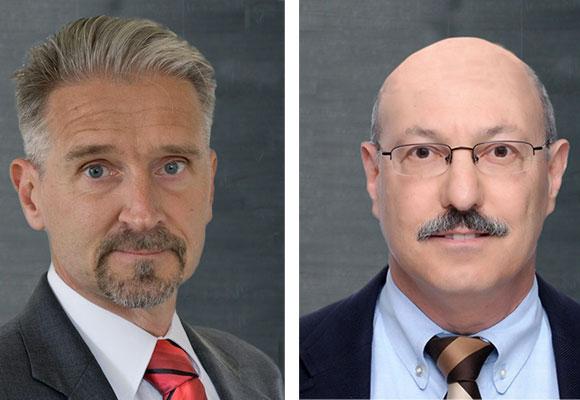Levinson, Zappe will lead the journal beginning in January 2020

Credit: SPIE
BELLINGHAM, Washington, USA, and Cardiff, UK — Two new co-editors-in-chief will take the helm of the Journal of Micro/Nanolithography, MEMS, and MOEMS (JM3) starting 1 January, 2020. Harry Levinson, a consultant at HJL Lithography, and Hans Zappe, the Gisela and Erwin Sick Professor of Micro-Optics at the University of Freiburg in Germany, will share editorial duties for the journal, published by SPIE, the international society for optics and photonics.
JM3 publishes papers on the science, development, and practice of lithographic, fabrication, packaging, and integration technologies necessary to address the needs of the electronics, MEMS, MOEMS, and photonics industries. The wide range of such devices includes biomedical microdevices, microfluidics, sensors and actuators, adaptive optics, and digital micromirrors.
“We are very pleased that Harry Levinson and Hans Zappe will be assuming joint editorship of JM3. Their combined technical expertise and years of experience in the communities served by the journal will be extremely beneficial in steering the journal into its next phase. We look forward to the leadership and vision they will bring to the journal and the communities it serves,” said David Sampson, a member of the SPIE Board of Directors and chair of the Publications Committee.
A longtime associate editor of JM3, Zappe will manage the MEMS, MOEMS, and microfabrication side of the journal. Levinson, well known in the lithography community, will handle micro/nanolithography and related metrology technologies.
They succeed Chris Mack, who has served as editor-in-chief since 2012.
“JM3 is currently recognized as the world’s premier journal for lithographic technologies. I am looking forward to working with Dr. Zappe to continue the commitment to technical excellence established by our predecessors,” Levinson said.
“Our aim is to continue developing the profile and reach of JM3 as a premier outlet for exciting science and engineering developments in optical MEMS and advanced lithography,” Zappe said. “Supported by a strong editorial board and the resources of SPIE, JM3 can become the ‘go-to’ journal in both of these fields.”
Now a consultant, Levinson is a former senior director of GlobalFoundries’ Strategic Lithography Technology organization. He spent most of his career working in the field of lithography, starting at AMD. He also served for several years as the chairman of the USA Lithography Technology Working Group that participated in the generation of the lithography chapter of the International Technology Roadmap for Semiconductors. He has published numerous articles on lithographic science, on topics ranging from thin film optical effects and metrics for imaging, to overlay and process control, and he is the author of two books, Lithography Process Control and Principles of Lithography (published by SPIE Press). He holds over 60 US patents. Levinson is an SPIE Fellow, previously chaired the SPIE Publications Committee, and served on SPIE’s Board of Directors. In recognition of his contributions to SPIE, he received the Society’s 2014 Directors’ Award. He has a BS in engineering from Cornell University and a PhD in physics from the University of Pennsylvania.
Zappe is a leading international researcher in the areas of optical microsystems and micro-optical components and has made fundamental contributions to the state of the art in fluidic imaging systems, tunable lenses, and adaptive optics. He earned BSc and MSc degrees at MIT in 1983 and a PhD from the University of California, Berkeley, in 1989, all in electrical engineering. He worked at IBM (USA), the Fraunhofer Institute for Applied Solid State Physics (Germany) and the Centre Suisse d’Electronique et de Microtechnique (Switzerland), before joining the Department of Microsystems Engineering at the University of Freiburg in 2000. As part of his extensive research activities, Zappe founded the Priority Program “Active Micro-optics” and the Collaborative Research Center “Planar Optronic Systems,” both funded by the German Research Foundation. He has chaired a wide range of international conferences and served on the editorial boards of numerous optics and microsystems journals. At Freiburg he was dean of engineering from 2008 to 2010, dean of studies from 2002 to 2008, and currently serves as department chair. He is a Fellow of SPIE and IOP.
###
About SPIE
SPIE is the international society for optics and photonics, an educational not-for-profit organization founded in 1955 to advance light-based science, engineering, and technology. The Society serves more than 255,000 constituents from 183 countries, offering conferences and their published proceedings, continuing education, books, journals, and the SPIE Digital Library. In 2019, SPIE provided more than $5 million in community support including scholarships and awards, outreach and advocacy programs, travel grants, public policy, and educational resources. http://www.
Contact:
Daneet Steffens
Public Relations Manager
[email protected]
+1 360 685 5478
@SPIEtweets
Media Contact
Daneet Steffens
[email protected]
360-685-5478
Original Source
https:/




